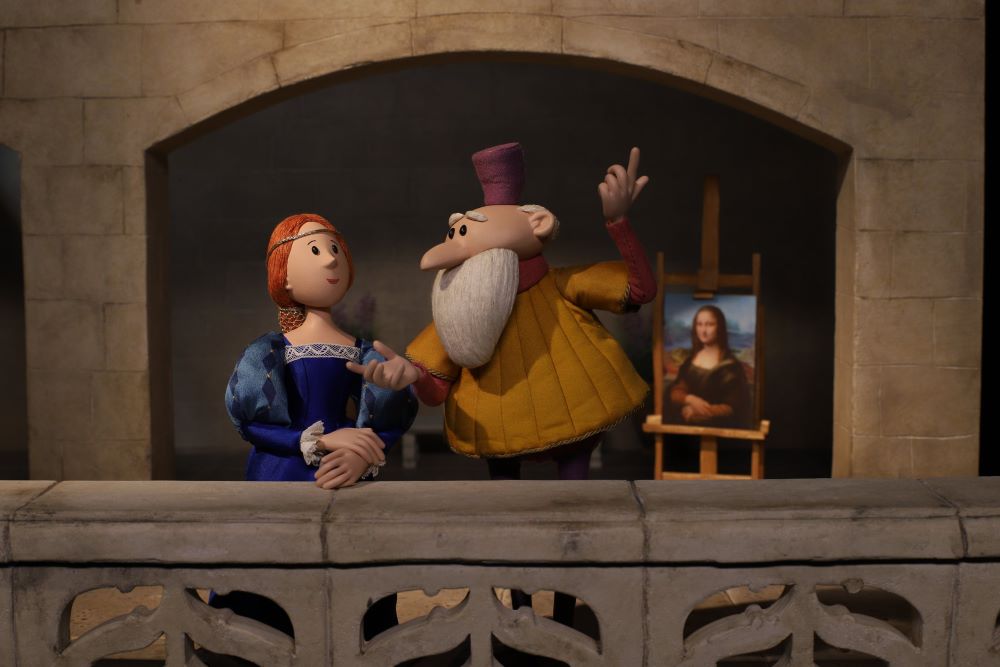Movie Info
Movie Info
- Director
- Jim Capobianco & Pierre-Luc Granjon
- Run Time
- 1 hour and 40 minutes
- Rating
- PG
VP Content Ratings
- Violence
- 2/10
- Language
- 0/10
- Sex & Nudity
- 0/10
- Star Rating
Relevant Quotes
An intelligent mind acquires knowledge, and the ear of the wise seeks knowledge.
Then Moses said to the Israelites, “See, the Lord has called by name Bezalel son of Uri son of Hur, of the tribe of Judah; he has filled him with a divine spirit, with ability, intelligence, and knowledge, and with every kind of skill, to devise artistic designs, to work in gold, silver, and bronze…

The title of the new film by writer Jim Capobianco (and co-director with Pierre-Luc Granjon) refers to the 16th century genius Leonardo da Vinci, voiced in this delightful, animated film by Stephen Fry. As the title indicates, the film focuses more upon da Vinci’s scientific interests that his artistic accomplishments, though we see several of his paintings—indeed, there are many scenes, in Italy and France, in which we see that he takes the not-quite-finished Mona Lisa wherever he goes. I knew I would like this film from the very beginning when the title card appeared in what looked like a foreign language, the words revealed when, in a mirror we see that the words were written backwards. This was the technique that Lonardo used in his treasured Notebooks in order to keep his writings a secret from prying eyes of strangers.
Although “genius” is always associated with him, this film suggests that another good descriptive word for his character is “curiosity.” The film covers only the last years of his life, and we see that in his old age he is as curious as ever curious about the Moon at which he gazes through a large magnifying glass while he is still in Rome. Curious about human anatomy, which he learns about by dissecting cadavers that his assistants steal from a cemetery. In a couple of funny scenes as two grave diggers talk, the body slowly is pulled away by an unseen person. The servants and da Vinci try to keep the corpses from being discovered by those who would condemn such illegal research.
One of those who would quickly turn the inventor over to the Inquisition is his patron Pope Leo X (Matt Berry), the tyrant who regards Michelangelo, seen high up on his back painting the ceiling of the Sistine Chapel, as the proper artist because he is obedient to the papal will. Leonardo is warned to behave “like a good little artist,” but this is futile for a man burning with curiosity as to what makes the world work—even to the point of embracing the heretical notion that the sun is not the center of the solar system. Leonardo’s interest in the human body includes his desire to discover where within it might be found the human soul.
When his ally at the papal court, a cardinal who is the pope’s brother, dies, Leonardo moves in 1516 to France with his two faithful servants Francesco Melzi (Angelino Sandri) and the towering but silent Zoroastro, at the invitation of King Francis I (Gauthier Battoue). The king proves to be a very vain monarch, interested more in how Leonardo can glorify himself than in his art. The King is backed by his ambitious mother Louise de Savoy (Marion Cotillard). Although da Vinci wins the King’s approval by pointing out that the ground on which he intends to build a palace is too soft to support its walls, the ruler turns out to be more interested in a statue of himself than da Vinci’s proposed Ideal City. In contrast, the King’s sister Princess Marguerite de Navarre (Daisy Ridley), a free thinker herself, is fascinated by his ideas.
Leonardo is safe in France from persecution for his far out (then) ideas but frustrated by being diverted from what he would like to do by being made to work on frivolous royal ego-centered projects, such as in the funny sequence depicting the King’s hosting England’s Henry the VIII (Daniel Swan) and Spain’s Charles V (Max Baumgarten). The portrayal of both kings is a caricature rather than factual, their belligerent antics played for laughs.
The film is beautiful to behold, being hand-crafted rather than computer generated. It switches back and forth between stop-motion animation and flat hand-drawn scenes, the latter dealing mostly with Leonardo’s ideas, including that of flight. We see the many drawings of da Vinci’s machines—a tank, a submarine, fortifications, wings for flying and of parts of the human body and its organs, all in the umber color used in his Notebooks.
As well as being a feast to the eye, the film’s music by Alex Mandel is a delight to the ear. (He wrote the music for Brave.) He composed the hour-long score plus nine songs that take us into the Inventor’s mind and heart. The songs help us feel and understand the Inventor’s sense of isolation and loneliness, most people fearing his ideas that threaten long-held beliefs promulgated by the Church. You can listen and watch the tuneful song “From This Tiny Seed” on YouTube and hear Leonardo declare that in the great cosmos everything, from the tiny seed, is interconnected.”
What was written in Exodus about Bezalel, the designer of the Tabernacle wherein the Israelites worshiped during their wilderness wanderings, is also true for this Renaissance genius, God “has filled him with a divine spirit, with ability, intelligence, and knowledge, and with every kind of skill.” And if ever the words of the author of Poverbs applied to a man, Leonardo da Vinci was that man, “An intelligent mind acquires knowledge, and the ear of the wise seeks knowledge.”
This is a film suitable for adults wanting to introduce their children to one of the most influential men of all time, even though they might be too young to understand some of the Inventor’s ideas, they can grow into them. (To get them to watch the film with you, tell them it was made by the man who helped bring Ratatouille to the screen.) After watching this delightful film, they will later will be candidates for watching the marvelous BBC dramatized documentary The Life of Leonardo da Vinci. This 1971 miniseries, available on YouTube, does cover all of the Inventor’s life, starting with his apocryphal death scene and then flashing back to his boyhood—for those who haven’t seen this miniseries, see my review later in this issue.
This review will be in the Oct. 2023 issue of VP along with a set of questions for reflection and/or discussion. If you have found reviews on this site helpful, please consider purchasing a subscription or individual issue in The Store.

